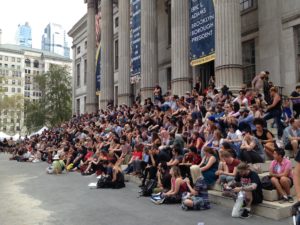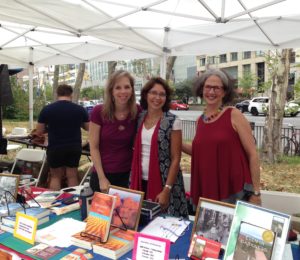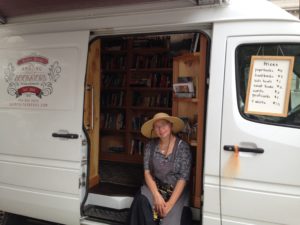Until this week, I kept my sanity reasonably well. The Women’s March right after the Inauguration helped a lot: singing and chanting with so many energetic, like-minded people from all over the country. Since then, here’s what has worked for me:
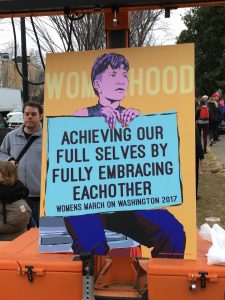
- Take action. From learning about the Dutch resistance, I know that even small things really help, and that there’s a job for everyone. I do what I’m good at and care the most deeply about, with people I like and respect, at reasonable hours. Some of this isn’t fun, but at least I know I’m not colluding with the other side through despair or inaction. My partner and I dig deeper into our household budget, prioritizing organizations who are suing the Administration, and those who are providing legal aid to migrants. I like writing those checks and I know they add up.
- Play with little children. It reminds me why all these issues matter so much, and that there is hope for the world as long as kids are being instilled with love, creativity and caring. Let them lead the way, at least to some extent. Many of them have such programmed lives. And be sure to read books to them, no matter how young they are. Babies love books.

- Read or re-read good books, alternating fine literature and my favorite form of trash. It will take you away, at least for the moment. I’ve read some fine books that will stay with me, most recently Louella Bryant’s Cowboy Code, the story of a young white girl in the South who transgresses the color line. For trash, my personal taste is overseas literary mysteries, like Donna Leon’s mouth-watering books set in Venice. It’s a great place to be for an hour before sleep.
- Create some sanctuary from news and technology every day. I struggle with this one. I wake up wanting to know what happened the night before, and it’s easy to get ensnared on the internet before bed. I try to have a couple of clear hours before turning out the light, or my sleep really suffers. And I start the day with a few hours of love, poetry, exercise, and a delicious breakfast before I face the whole world.

- Eat well and in good company. What a good time for us to savor the momentary pleasures that delicious food can provide! I have always lit candles and done dinner “properly” when friends come over, but now the importance of those gatherings feels so much greater. These bonds make it possible for us to care for the world as well as each other.
- Get out in nature, especially in this gorgeous season. It’s amazing how much ten minutes’ walk can help me put things in perspective. When I can observe something new or different, that makes it all even more worthwhile (a flower coming into bloom, a different shape of cloud). I try for one longer walk every day, but if all I do is three little ones, it still adds up. I’m not a morning person, but I do try to mark the sunset in some way every day, and to be aware of the moon.
- Remind yourself of the rich and varied history of humanity, which has included equivalent disasters and worse. Subscribing to Archeology Magazine has been a real treat for me. It reminds me that other civilizations have gone through hell before. If the world survived Caligula, it can survive this insanity. (Or I try to think so!)
- Listen to BBC Radio 4, or another foreign radio station of your choice. It not only shifts the perspective on world events, but provides an enormous range of cultural programming. Right now I’m savoring a podcast of Margaret Atwood’s latest book, The Testaments– not cheerful, but very interesting, and that too helps me cope.
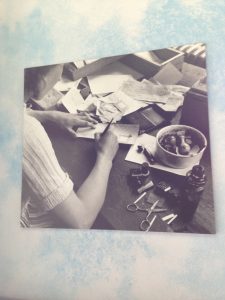
- Learn about the people who have resisted under far, far more difficult circumstances than ours. That’s what struck me as I researched An Address in Amsterdam, my novel about a young Jewish woman who joins the resistance. Although my heroine is a fictional character (based on many real ones), she accompanies me every day. When I feel tired or want to opt out of an action, she reminds me that I have to keep on keeping on.
- Give yourself a break sometimes. Turn it all off and do something that will predictably give you joy. The I Ching speaks of the importance of relining the well. Otherwise, it cannot give fresh water indefinitely. Let yourself stop and smell the flowers without remembering that the planet is in danger for that moment.
These strategies worked for me until this week, when the Air Force is sending two F-35 nuclear bombers to the Burlington, Vermont airport. It’s two miles from my house. People have been opposing it for eight years, for peace, environmental, economic, and health reasons. I guess I’d better stop grousing and write to the Airport Commission. Then I might just settle down with a book.

